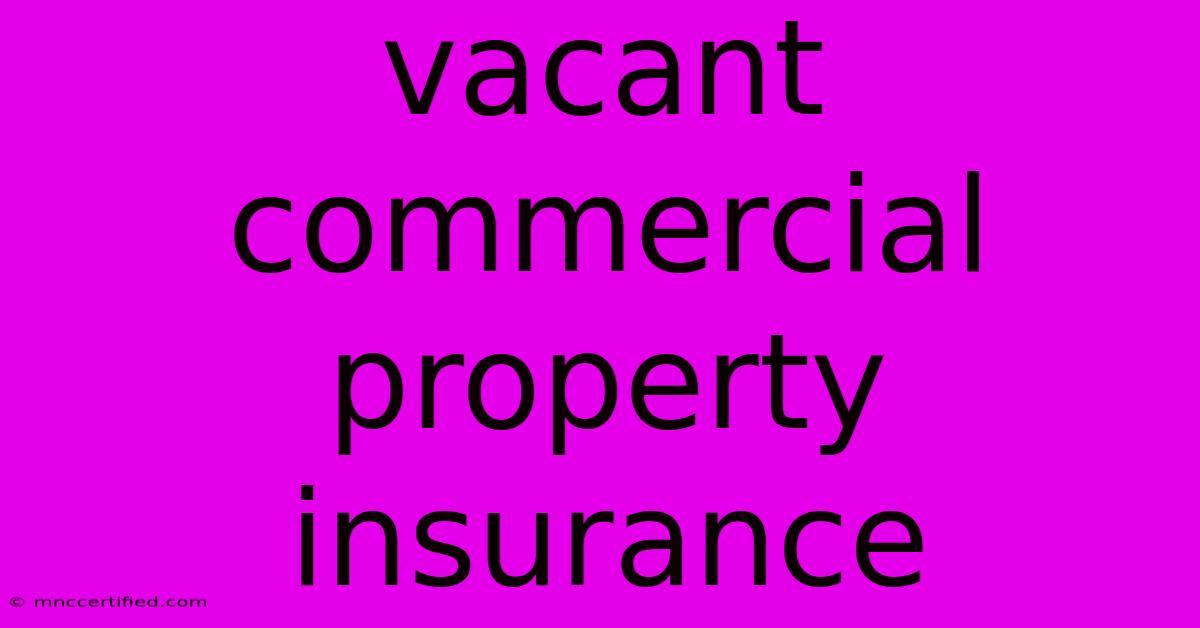Vacant Commercial Property Insurance

Table of Contents
Vacant Commercial Property Insurance: Protecting Your Empty Spaces
Owning a commercial property can be a significant investment, and it's crucial to protect your asset even when it's vacant. Whether you're between tenants, undergoing renovations, or preparing for a future use, vacant commercial property insurance plays a vital role in safeguarding your financial interests.
Why You Need Vacant Commercial Property Insurance
Vacant properties are more susceptible to various risks compared to occupied buildings. Here's why specific insurance is essential:
- Increased Risk of Vandalism and Theft: Empty buildings are prime targets for thieves and vandals. Without regular monitoring, your property faces a heightened risk of damage or stolen assets.
- Water Damage: Plumbing issues, burst pipes, or severe weather can lead to significant water damage, causing costly repairs and potential mold growth.
- Fire Hazards: Vacant buildings are at a higher risk of fire due to potential electrical malfunctions, arson, or negligence.
- Liability Concerns: Even a vacant property can pose liability risks. A visitor injured on the premises or an incident leading to damage to a neighboring property can result in costly lawsuits.
What Does Vacant Commercial Property Insurance Cover?
A vacant commercial property insurance policy typically covers:
- Building damage: Coverage for fire, windstorm, vandalism, theft, and other perils.
- Contents coverage: Protection for any equipment, furniture, or other assets stored within the vacant building.
- Liability coverage: Provides protection against lawsuits arising from accidents or injuries on the property.
- Additional coverage: Policies may include optional features like business interruption coverage, which compensates for lost income during the period of repair or reconstruction.
Understanding Policy Exclusions
It's essential to thoroughly review your policy to understand what is not covered:
- Long-term vacancy: Many policies have specific time limits for vacancy. If your property remains vacant for an extended period, your coverage may be reduced or even canceled.
- Neglect and maintenance: If the property is poorly maintained or left in a condition that increases the risk of damage, coverage may be denied.
- Certain perils: Some policies might exclude coverage for specific risks like earthquake or flood damage.
Getting the Right Coverage for Your Needs
When purchasing vacant commercial property insurance, consider these factors:
- Property type and size: The nature and size of your building will influence the level of coverage required.
- Vacancy duration: The length of time the property will remain vacant is a key factor in determining the appropriate policy.
- Risk assessment: A thorough risk assessment can identify potential hazards and help tailor coverage to your specific needs.
- Previous claims history: Your past claims history can impact your premium rates.
How to Find a Reliable Insurance Provider
- Research and compare: Don't just settle for the first quote you receive. Get quotes from multiple insurers to compare prices, coverage, and policy terms.
- Seek expert advice: Consult with an insurance broker or agent specializing in commercial property insurance to get personalized guidance.
- Read the policy carefully: Before signing, understand the fine print and ensure the policy covers your specific needs and risks.
By taking these steps, you can obtain the right vacant commercial property insurance to protect your valuable investment and provide peace of mind.

Thank you for visiting our website wich cover about Vacant Commercial Property Insurance. We hope the information provided has been useful to you. Feel free to contact us if you have any questions or need further assistance. See you next time and dont miss to bookmark.
Featured Posts
-
Conklin Week 10 Status Cardinals Game
Nov 11, 2024
-
Steelers Win Nail Biter Over Commanders 28 27
Nov 11, 2024
-
Celebrate Anti Bullying Week Nov 11 15
Nov 11, 2024
-
Bitcoin At 81 000 Trump Election Effect
Nov 11, 2024
-
Final Plant Dates For Crop Insurance
Nov 11, 2024